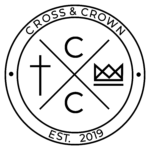
What is Macrina’s Table?
Macrina’s Table is Cross and Crown’s speaker series, geared toward starting intellectual conversations in the local church.
Having good conversations about history, philosophy, theology, art, ethics, etc., is an important part of Christian community. Some of the most fruitful periods in church history have come out of good conversation (around Macrina the Younger’s table, for instance, or Luther’s). Today, the church is one of the last places where those kinds of conversations are possible. The church needs it, and so does the world.
Upcoming Speakers
Dr. Erik Herrmann – 05/10/24 – C.S. Lewis: The Joy of Beauty and Mirth
Dr. Scott Stiegemeyer – TBD – Every Ethos Implies a Mythos
______________________________________________
For more details, see below.
Past Speakers and Topics
Dr. Jordan Cooper – Theosis
Dr. Joel Biermann – Niebuhr’s Christ and Culture: A Reappraisal
William Schumacher – Serious, Diverse, and Peaceful: America’s Strange Religion
Community Discussion of Anselm’s Proslogion
Evan Underbrink – Theopoetics
Dr. Leo Sanchez – Immigration and Christianity
Community Discussion of Roger Scruton’s Why Beauty Matters
Dr. Kent Burreson and Dr. Beth Hoeltke – From Baptism to Burial: Death, Life, & New Creation
Zach Eshelman – Liturgy in the City: A Folk-Formative Approach
Dr. Joel Oesch – The Near and Far God
Dr. Adam Koontz – The New Testament church’s relationship to the world around them
Dr. Benjamin Schumacher – The Lessons of Paradox
Dr. Joel Biermann – Work and Rest
Who was Macrina?
Macrina the Younger lived in the A.D. 300s. When her parents died, she turned the family estate into a Christian community. There she taught her younger brothers philosophy and theology and modeled a life of profound spirituality1. Their home became a center of theological conversation for the group that became known as the Cappodocian Fathers – Gregory of Nyssa and Basil the Great, two of Macrina’s brothers, and their friend, Gregory of Nazianzus. The Cappodocian fathers helped formulate and defend the doctrine of the Trinity. Gregory of Nyssa wrote a biography of Macrina in which he called her “sister and teacher at the same time.” He also said that she was the only one he trusted to answer the objections of unbelievers to the resurrection of the dead.
______________________________
1. See Jaroslav, Pelikan, Christianity and Classical Culture: The Metamorphosis of Natural Theology in the Christian Encounter with Hellenism.
Macrina’s Prayer
You, O Lord, have freed us from the fear of death. You give our bodies, which you have made with Your hands, to the earth to rest in safety until the last trumpet sounds. Then You will take our mortal and unsightly remains and transfigure them with immortality.
To free us from sin and from the curse laid upon us, You took both sin and the curse upon Yourself. You crushed the head of the dragon that had seized men by the throat. You shattered the gates of hell and trampled the devil, death’s lord, beneath Your feet. You cleared the way for our resurrection. You broke the flaming sword and restored to Paradise the man who was crucified with You and implored Your mercies.
Remember me, too, in Your kingdom. Do not let the slanderer stand against me in the way or let my sin be found in Your eyes, if I have been led astray by the weakness of my nature. O You Who have the power to forgive sins on earth, forgive me, that I may be refreshed, and when I put off my body let me stand before you with my soul unspotted and undefiled. Amen.
______________________________
2. Adapted from Nyssa, Gregory, The Life of Macrina.
Upcoming Speaker Details:
Dr. Erik Herman – C.S. Lewis: The Joy of Beauty and Mirth
C.S. Lewis rarely wrote about beauty directly, but his writings are often extremely beautiful. For Lewis,
the beautiful was an ongoing witness to the truth of Christianity, evoking a longing that only God can
fulfill. Likewise, mirth for Lewis was not just laughter or living with a sense of humor but the response
to joy of God, the disposition of a grateful heart, and the effervescence of the Christian even in the
midst of suffering. In this lecture, we will look at examples from Lewis’ writings — his poetry, essays,
and his fiction — in order to set forth Lewis' vision of the beauty and buoyancy of faith and how it is
still needed today.
Dr. Erik Herrmann taught historical theology at Concordia Seminary, St. Louis, from 2005-2023. His
area of interest and expertise is in the history of the Reformation, the theology of Martin Luther, and
the history of biblical interpretation. He continues to write and publish in areas of Reformation
theology and is presently writing a book for the New Studies in Dogmatics series from Zondervan on
the doctrine of the Church.
Dr. Scott Stiegemeyer – TBD – Every Ethos Implies a Mythos: Bioethics and Theological Anthropology and Horror Movies
The Reverend Doctor Scott Stiegemeyer teaches theology, church history, and bioethics at Concordia University, Irvine. Scott is originally from Kansas City, MO. He graduated from Concordia University-Ann Arbor, MI in 1991. He later earned a Master of Arts degree in bioethics from Trinity International University, Deerfield, IL. Prior to coming to Concordia University, he served as a pastor in Pittsburgh, PA, the Director of Admission at Concordia Theological Seminary in Fort Wayne, IN, and as pastor of Redeemer Lutheran Church in Elmhurst, IL. Scott writes and speaks often about bioethics, the theology of the body, and issues in contemporary ministry.
